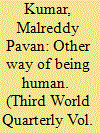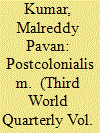| Srl | Item |
| 1 |
ID:
108091


|
|
|
|
|
| Publication |
2011.
|
| Summary/Abstract |
This essay articulates the ways in which the Indigenous People's Movement leading to the United Nations Declaration on the Rights of the Indigenous Peoples (2007) succeeds in what postcolonial theory has conventionally set out to emancipate, but has failed to do. Postcolonial theory challenges all eurocentric and liberal humanist discourses on rights which place the Western subject as the ideal subject figure of all histories and societies, and appeals for a language that would articulate other ways of being human and humanist. Yet recent trends in postcolonial theory have come to embrace the language of cosmopolitanism and humanism as viable alternatives for a postcolonial future. Drawing upon the principle thematic of the UN Declaration on the Rights of the Indigenous Peoples, the article suggests that the Declaration provides an alternative to postcolonial theory's revisionist humanism-the re-cognition of difference. As part of the international legal discourse, the Declaration is particularly noted for its political victory in the legitimisation of collective rights in postcolonial societies. Furthermore, as the Universal Declaration of Human Rights (1948) remains an integral part of the collective rights of the Indigenous Peoples, the article suggests that the Indigenous People's Movement succeeds in negotiating a language that would legitimise other ways of being human without being adversarial or antithetical to euro-humanism.
|
|
|
|
|
|
|
|
|
|
|
|
|
|
|
|
| 2 |
ID:
106644


|
|
|
|
|
| Publication |
2011.
|
| Summary/Abstract |
This essay critically examines the nature and scope of postcolonial interdisciplinarity. Although postcolonial studies claims to operate on, and forge in, an interdisplinary approach, its intentions are largely interdiscursive. In spite of the vague and elusive claims evident in the catalogue of introductory texts on postcolonial theory, neither postcolonial theorists nor its exponents have adequately established the disciplinary bounds or their methodological fusion(s) specific to, and required for, interdisciplinarity. Drawing from the disciplinary foundations of literature, history and philosophy, this essay demonstrates that postcolonial theory has developed an implicit oppositional critique to eurocentrism. This oppositional critique, while discursive in intention and formulaic in application, is subsequently borrowed by a host of social science disciplines-anthropology, geography and development studies- as a proxy methodology that protects against the perils of eurocentric longings.
|
|
|
|
|
|
|
|
|
|
|
|
|
|
|
|